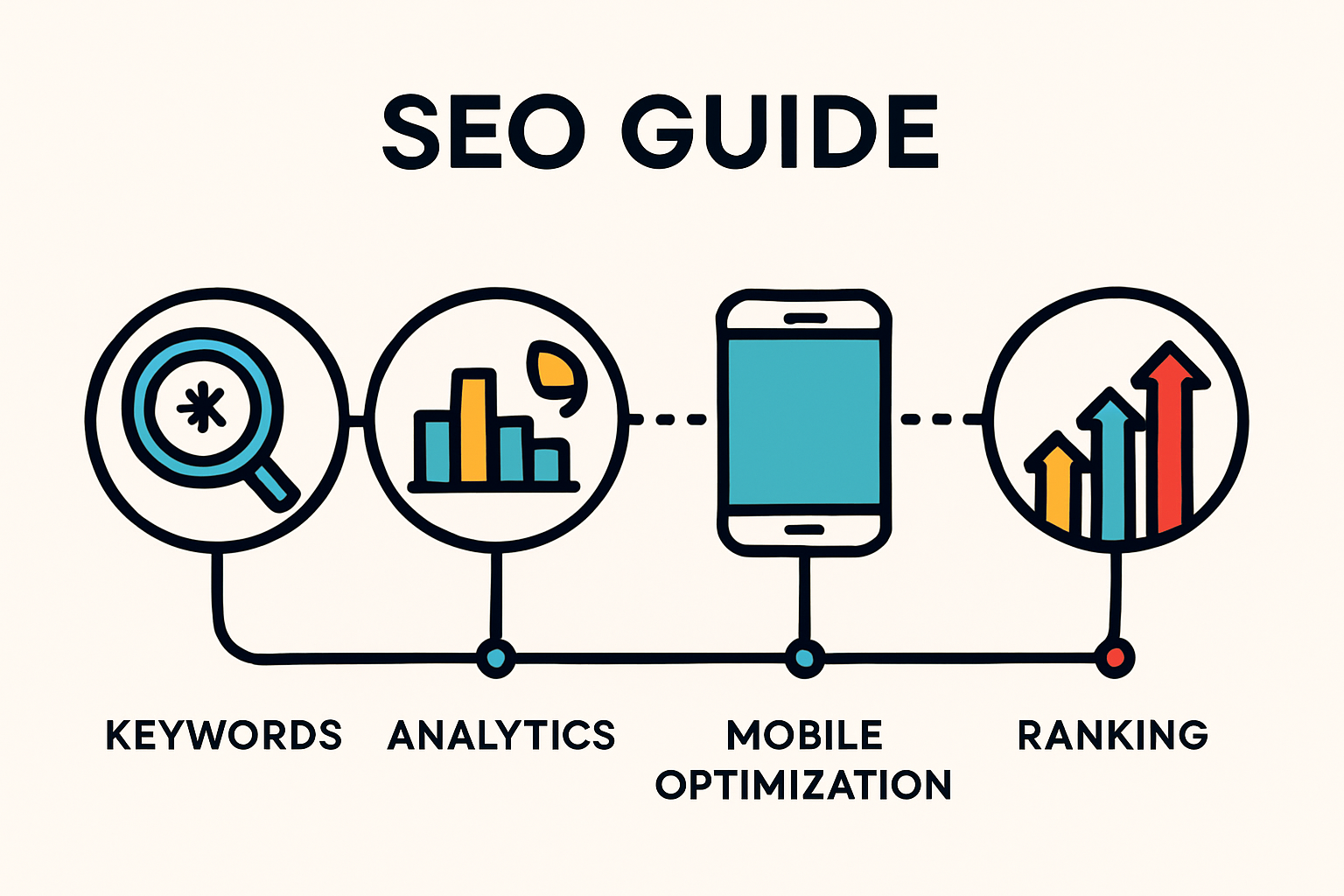1. What is SEO?
SEO (Search Engine Optimization) is the process of improving a website so that it ranks higher in search engines like Google, Bing, or Yahoo for relevant searches.
Think of search engines as librarians of the internet. They want to recommend the best, most relevant, and most trustworthy content to users. SEO helps your website become that “recommended book.”
👉 Goal: Increase visibility, attract organic traffic, and drive conversions.
2. Why is SEO Important?
- 93% of online experiences start with a search engine.
- Paid ads stop when your budget ends, but SEO works long-term.
- Better rankings = more trust & credibility.
- SEO traffic = Free, consistent, and high-intent visitors.
3. How Search Engines Work
Before doing SEO, you must understand how Google works in 3 steps:
- Crawling – Bots scan your site for content.
- Indexing – Search engine stores and organizes content.
- Ranking – Algorithms decide which page is most relevant.
4. Types of SEO
SEO isn’t just one thing—it’s a mix of techniques:
A. On-Page SEO
Optimizations done on your website pages.
- Keywords research & placement
- Title tags & Meta descriptions
- Headings (H1, H2, H3…)
- Content quality, readability & depth
- Image optimization (alt text, compression)
- Internal linking
B. Off-Page SEO
Actions taken outside your site to build credibility.
- Backlinks (links from other websites to yours)
- Social signals (shares, engagement)
- Guest posting
- Brand mentions
C. Technical SEO
Making sure search engines can crawl & index your site easily.
- Website speed & performance
- Mobile-friendliness (responsive design)
- Secure site (HTTPS)
- Fixing broken links, redirects
- XML sitemaps & Robots.txt
D. Local SEO (for businesses targeting local customers)
- Google Business Profile optimization
- Local keywords (e.g., “Dentist in Nagpur”)
- Reviews & ratings
- Local citations
5. Keyword Research – The Foundation of SEO
Keywords are the search terms users type into Google.
🔹 Steps to do Keyword Research:
- Brainstorm seed keywords (e.g., for a bakery: “cakes,” “birthday cake delivery”).
- Use tools like Google Keyword Planner, SEMrush, Ahrefs, or Ubersuggest.
- Check search intent:
- Informational (“How to bake a cake”)
- Navigational (“Zomato login”)
- Transactional (“Buy chocolate cake online”)
- Commercial (“Best cake shop in Nagpur”)
- Look for long-tail keywords (more specific, less competition).
- Example: Instead of “cakes” → “customized birthday cakes in Nagpur.”
6. Content is King 👑
Search engines love content that is:
- Relevant (matches search intent)
- Comprehensive (covers topic deeply)
- Unique (no copy-paste)
- Updated (fresh information)
🔹 Tips for SEO-friendly content:
- Use keywords naturally (avoid keyword stuffing).
- Add headings, bullet points, short paragraphs.
- Optimize images (alt tags, compression).
- Include internal + external links.
7. Link Building (Backlinks)
Backlinks = Votes of trust from other websites.
Ways to build backlinks:
- Guest posting on relevant blogs
- Creating share-worthy content (guides, infographics, case studies)
- Outreach (emailing site owners for collaboration)
- Getting listed in directories
- Broken link building (finding broken links on other sites & suggesting your content)
👉 More high-quality backlinks = Higher Google trust.
8. Technical SEO Essentials
- Mobile-first indexing → Google ranks mobile versions first.
- Website speed → Use tools like PageSpeed Insights or GTmetrix.
- Crawlability → Submit XML sitemap in Google Search Console.
- Structured Data (Schema Markup) → Helps Google understand content (like reviews, products, events).
- Fix errors → 404 pages, redirect loops, duplicate content.
9. SEO Tools Freshers Should Learn
- Google Search Console – Monitor site performance.
- Google Analytics (GA4) – Track visitors, traffic, and conversions.
- Google Keyword Planner – Free keyword tool.
- Ubersuggest / Ahrefs / SEMrush – Competitive research.
- Yoast SEO / RankMath (WordPress plugins) – Easy on-page SEO.
10. Measuring SEO Success
SEO is not instant—it’s a long-term investment. Measure:
- Organic traffic growth
- Keyword ranking improvements
- Click-Through Rate (CTR)
- Bounce rate & average session duration
- Conversions (sales, leads, sign-ups)
11. Common SEO Mistakes Freshers Make
❌ Keyword stuffing
❌ Buying spammy backlinks
❌ Ignoring mobile-friendliness
❌ Not optimizing meta tags
❌ Copying content
❌ Expecting results in 1 week (SEO takes 3–6 months typically)
12. The Future of SEO
- Voice Search (people using Alexa, Siri, Google Assistant)
- AI & Search (Google Gemini, Bing AI, ChatGPT)
- Video SEO (YouTube is the 2nd biggest search engine)
- E-E-A-T (Experience, Expertise, Authoritativeness, Trustworthiness)
✅ Final Advice for Freshers:
Start with the basics → Practice on your own website/blog → Use free tools → Follow Google updates → Be patient.
SEO is not about tricks; it’s about creating the best possible experience for users and search engines alike.
